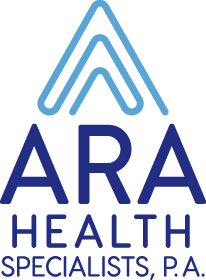By Sheri Fleeman, MD, ARA Health Specialists and Co-Director of Breast Imaging at the Sarah Cannon Cancer Program at Mission Health, and Heather Mann, PA-C, ARA Health Specialists, Breast Imaging Physician Assistant at the Sarah Cannon Cancer Program at Mission Health
October is nationally recognized as Breast Cancer Awareness Month, so during this month – and always – we want to remind women how important regular breast cancer screenings are to early detection and positive outcomes.
One in eight women will be diagnosed with breast cancer over the course of their lifetime, with 1 in 6 of these diagnosed in their forties. However, the past eighteen months have been unprecedented. We have been forced to put many parts of our lives on hold. Unfortunately, breast cancer does not stop for a pandemic. According to the American Cancer Society, over 330,000 new cases of breast cancer are expected to be diagnosed in women in the United States in 2021. Although the mortality rate from breast cancer had been steadily decreasing due to treatment advances and earlier detection, the National Cancer Institute predicts the pandemic will result in a long-term increase over the next decade. Delaying your screening mammogram may lead to a delayed diagnosis and increase your risk of dying from breast cancer. This is scary, but knowledge is power, and your healthcare is in your hands. Know that we are committed to serving the women of our community in a friendly and safe environment. Our goal is to find cancers early when they are small and easier to treat. So, what can you do to reduce your risk?
Get your yearly 3D Screening Mammogram:
Major health organizations, including the American Cancer Society and the Society of Breast Imaging, recommend starting yearly screening 3D mammography at age 40, as this results in the greatest reduction in breast cancer deaths, and the largest number of life years gained compared to other less frequent screening models. This advanced technology gives us a better look inside the breast, allowing us to find small cancers while calling fewer women back from their screening exam for additional images. All women age 40 and older should have a yearly 3D mammogram, regardless of their risk category and breast density. 3D Mammography is now offered at all Mission Health imaging facilities.
Know Your Risk:
All women should have a formal breast cancer risk assessment by the time they are age 30. If this assessment demonstrates that a woman falls into the high-risk category, she should begin annual screening at age 25-30, depending on individual circumstances. The American College of Radiology and Society of Breast Imaging recommend yearly screening with Breast MRI in addition to yearly mammography for high-risk women. Breast MRI is an extremely sensitive exam that uses a strong magnet to give us detailed pictures of the breast from many different angles. Contrast Enhanced Mammography, a mammogram obtained after giving intravenous contrast, is another tool that we can use as an alternative to Breast MRI.
Know Your Density:
Approximately 40% of women age 40 and over have dense breast tissue. Some cancers can hide in dense breast tissue and be difficult to see on a mammogram. For these patients, there are other screening tests that can supplement mammography and help us find early-stage breast cancers. One such test is ABUS (Automated Breast Ultrasound), which is performed in addition to yearly mammography for women who are average risk. It allows us to systematically look at the entire breast with an automated machine using sound waves. The radiologist can then scroll through these images, looking for areas that appear different from the surrounding tissue.
Know Your Normal:
Critical to a woman’s self-care is self-examination of her breasts. Women know their own bodies the best and we encourage them to be aware of how their breast tissue normally looks and feels, and to talk with their doctor if there are any new or concerning findings.
ARA Health Specialists partners with and reads for the Sarah Cannon Cancer Program at Mission Health. Our team is always available to help patients better understand their risk and screening options. Do not put off your care – schedule a screening mammogram today.
To schedule a mammogram, call 828-213-9729 or request an appointment online .





